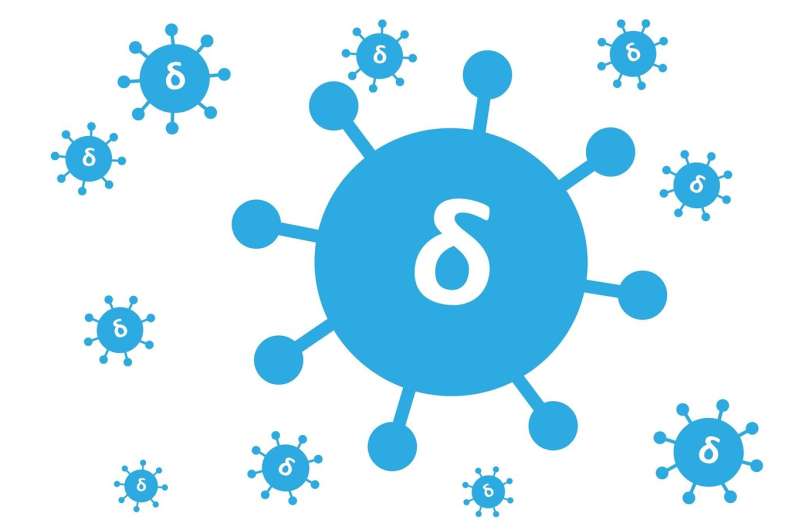
With every new variant of SARS-CoV-2 that emerges to cause a surge in cases, a worrisome question also arises: Could the virus eventually arrive at a set of mutations that would enable it to fully evade our immune response?
A new study, published in Nature, suggests that it will be hard for the virus to get there. Studying dozens of naturally occurring and laboratory-selected mutations, including those found in Delta and other concerning variants, researchers found that a future SARS-CoV-2 variant will need to pack about 20 of the right mutations to become fully resistant to the antibodies that an average person generates in response to a coronavirus infection or vaccination.
But even if the virus pulls off this genetic feat, it still remains vulnerable to an improved set of antibodies: those arising after natural infection and further boosted through mRNA vaccines.
The findings suggest that our immune system, if properly stimulated, is capable of dealing with the worst that the coronavirus may have to offer for the foreseeable future. “Immunity in people who fought off COVID last year and later received mRNA vaccines is impressively broad,” says Paul Bieniasz, head of the Laboratory of Retrovirology at Rockefeller. “This tells us that although natural infection or the vaccines lead to immunity, they have in no way come close to exhausting the capacity of the human immune system to mount defense against this virus.”
Polymutant viruses
Just as the coronavirus comes in many variants, so do our antibodies. That’s why even the Delta variant, the most contagious version of SARS-CoV-2 so far, doesn’t entirely escape our immune response. It may be dodging some of the antibodies we produce, but not all of them. But Delta is not the last version of SARS-CoV-2 that we are going to see. The virus is still replicating at a high rate in large populations—new mutations are popping up, and new variants are continuously arising.
Postdocs Fabian Schmidt and Yiska Weisblum set out to identify which kinds of mutations give SARS-CoV-2 the edge over antibodies. For the study, they first created a safe stand-in for the coronavirus by tweaking a different, harmless virus to express SARS-CoV-2 spike protein on its surface. As the faux coronaviruses replicated, some picked up mutations as they made mistakes copying themselves. The team then bathed the faux coronaviruses in plasma samples from people who had recovered from COVID, and selected the mutants that escaped neutralization by antibodies. A few rounds of this and the team found many mutations that were in the same locations as those occurring naturally in SARS-CoV-2 variants, including those found in Delta or other variants of concern.
The researchers then created a “polymutant” virus: a faux coronavirus sporting a spike protein featuring 20 of the worst of those mutations all at once. This polymutant showed near-complete resistance to antibodies generated by individuals who have been infected by or vaccinated against SARS-CoV-2. “So it is possible for the virus to evolve and evade the majority of our antibodies, but the genetic barrier to that occurring is quite high,” Bieniasz says.
Extra immunity
Findings from one group of people suggest that in the long run, our immune system will win the race against the mutating coronavirus. People who have experienced both natural infection and vaccination produce remarkably effective antibodies. Previously, the Rockefeller team that includes Michel Nussenzweig, Paul Bieniasz, and Theodora Hatziioannou, a research associate professor at Rockefeller, found that after the infection subsides, antibodies continue to evolve over several months, becoming better at binding tighter to the spike protein. Receiving mRNA vaccines strongly boosts those antibodies even more, increasing them in numbers and improving their ability to cope with many of the variants simply by binding tighter and tighter to the original sequence.
In the current study, plasma from those who had been both infected and vaccinated neutralized the polymutant spike. It also neutralized the six SARS-CoV-2 variants tested, as well as the original SARS coronavirus and SARS-like viruses found in bats and pangolins. “Antibodies from this group of people are incredibly potent and flexible,” says Hatziioannou, who co-directed the study. “It’s likely that they offer protection against any SARS-CoV-2 variants in the future and possibly against future coronavirus pandemics.”
More studies would show whether booster shots could lead to a similar improvement of antibodies in vaccinated people who have never been infected with the coronavirus.
Rockefeller University

